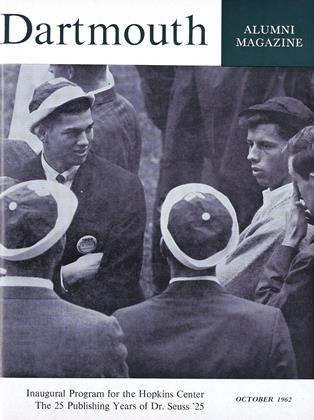Dartmouth College was one of five institutions to which the Alfred P. Sloan Foundation this summer granted one million dollars each for the strengthening and updating of engineering education. The Foundation stated that “here in the United States there is at this moment a special and urgent demand for engineers with a broad base in the sciences,” and its supporting program, involving Brown, Johns Hopkins, Princeton, and the University of Rochester as well as Dartmouth, aims to increase the supply of “individuals who have had basic engi- neering training, who have had solid undergraduate courses in the funda- mentals of mathematics, physics, and chemistry, and who have also had a sub- stantial amount of graduate training.”
The Sloan Foundation directed its financial support to those institutions where engineering is in close relation to strong departments in the basic sciences and “where distinguished and vigorous leadership has already indicated their own desire to develop engineering education along the lines indicated above.”
A thorough examination of Dart- mouth’s engineering program in 1954 led to the establishment of the College’s pres- ent Department of Engineering Science, pulling together engineering and the basic sciences, and to the strengthening of the graduate program offered by the Thayer School of Engineering. Dean Myron Tribus of Thayer School, who came to Dartmouth from UCLA in 1960, hailed the Sloan Foundation grant as the means of bringing the School to a new level of achievement in the direction emphasized by the Foundation. “Thayer School,” he said, “hopes to serve as a model in engi- neering education, providing a strong background in liberal learning, a firm grounding in the physical sciences, and a graduate-level treatment of engineering, through the doctor’s degree, that will produce men capable of serving society at the highest level in the engineering profession, either as teachers or prac- titioners.”
Looking ahead to the day when present plans will be fully realized, Dean Tribus said that engineering degrees at the bachelor, master, and doctor levels would be awarded, and that engineering enroll- ment and faculty would be considerably increased. The grant will also make pos- sible the purchase of new laboratory equipment to permit staff members to initiate research projects in advance of the expected outside support. “The proposed program,” Dean Tribus added, “has the strong endorsement of the whole institution, a fact we believe essential to achieving the kind of profes- sional education envisioned.”
 View Full Issue
View Full Issue
More From This Issue
-
 Feature
FeatureDr. Seuss
October 1962 By CLIFFORD L. JORDAN '45 -
 Feature
FeatureThe Vanishing Ability To Write
October 1962 By George O’Connell -
 Cover Story
Cover StoryThe Big Day Draws Near
October 1962 -
 Feature
FeatureTRUSTEES SANCTION A FOURTH TERM
October 1962 -
 Article
ArticleTHE FACULTY
October 1962 By George O’Connell -
 Sports
SportsWITH THE BIG GREEN TEAMS
October 1962 By Dave Orr ’57







